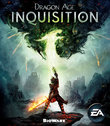Doesn't it always suck when things are over too soon? While for a while, games used to come with 30+ levels, and 60+ hours of gameplay, in today's throwaway world of hollywood-esque blockbusters, you'll be lucky to find one that lasts for more than 8. Heck, some games even skimp on the single player to "encourage" you to transition across to the multiplayer if you want to get your money's worth (we're looking at you Call of Duty). So wouldn't it be great to play a game for over 30 hours and still have only scratched the surface of its content? Well, yeah - and that just about describes Dragon Age: Inquisition.
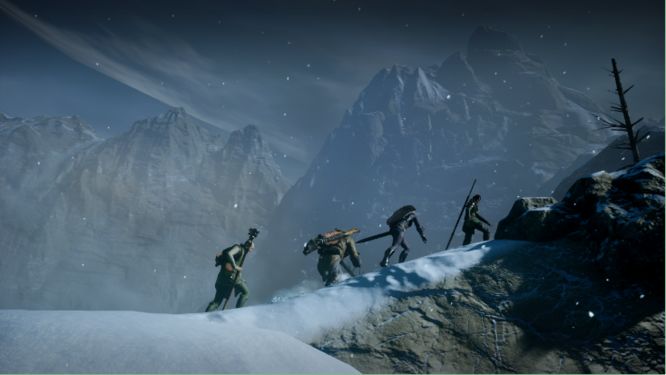
This is just the beginning of a massive adventure for you to undertake.
For those of you who didn't read our Dragon Age Inquisition preview here's a little recap. In Dragon Age Inquisition, you play as the Inquisitor, the sole survivor of a cataclysmic explosion that broke open a rift to the fade (a really bad place filled with demons and spirits) and killed a lot of people in the process. The mystery of just how you managed to escape this 'breach' with your life intact when no one else did is just the beginning of many unanswered questions. The only thing that's clear is that the mark on your hand may be the key to closing the massive green tear in the sky that's spitting out evil all over the land. If that wasn't a monumental enough task, as a member of the newly founded Inquisition, its also up to you to not only close the breach, but to restore order to the civil unrest and political chaos spreading across the land of Thedas.
You'll start the game by choosing your race. This time Bioware has gone gone all out, letting you choose from the myriad of races that inhabit the world of Thedas. Whether its Human, Dwarven, Elven or Qunari (the huge muscle bound horned race of the Dragon Age series), which class and race you choose will have a significant effect on how the game plays out. For example, in the world of Dragon Age there are people that may treat you differently if you happen to be a non-human race, or even down right negatively if you're a mage. So of course, if you're a rebel and an outcast like us, you'd choose to play as an elven spell-caster.
Next up we got to grips with Inquisition's robust new character creator. While you can choose from several character presets, the real joy here is tailoring every aspect of your hero, from your standard fair such as their hair and eye colour or facial shape, to more advanced options like a broken nose, tattoos and scar depth.
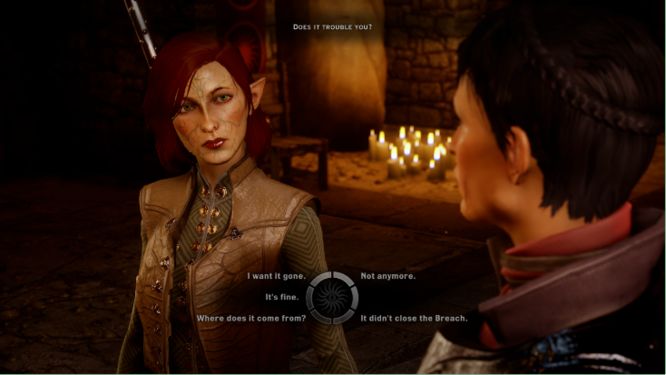
The character creator is fantastic. You can create anything, like our elven mage Isolde.
At the core of Dragon Age Inquisition is exploration. As a member of the Inquisition your main job is to explore the lands, solve problems and recruit followers. Lucky for you then, that the world of Thedas is just about the perfect place to set about exploring, as it's so utterly gigantic, hugely varied, and full of things to do. It's quite literally one of the biggest role playing games we've ever played.
Like past iterations of the series, Dragon Age Inquisition isn't one big sandbox - instead, its several locations segmented into individual areas on an all encompassing world map. While that may seem like a bit of a weird way to do things, it's hard to really complain when the average size of each area is literally the size of your average open world adventure game. Every location has a unique look and feel, and you'll never feel like you're exploring the same place twice - a welcome far cry from the repetition seen in Bioware's last effort, Dragon Age 2.
These vast areas are also filled to the brim with things to do. You'll constantly find something new to do, whether its questing for the locals, picking herbs, mining supplies, solving star gazing puzzles or just kicking back and watching the local wildlife fighting each other (you'll be in awe the first time you see two of the world's largest beasts going toe to toe). You'll want to explore every nook and cranny, too, as there's a good chance you might stumble upon items for quests you didn't even know about yet.
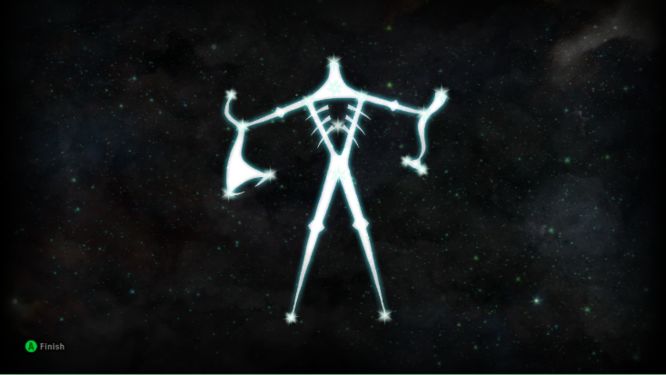
Stargazing puzzles are just one of the many things you can do in Inquisition
Of course, it's important to not get ahead of yourself either. While adventuring is all well and good, if you get a bit too cocky, you may well find yourself stumbling across a cave filled with horrifying high level giant spiders that you're nowhere near ready for. Kind of like we did. Lesson learned. Thankfully the game's rather forgiving, and will respawn you right before you made the (wrong) decision to wander into that area - but it goes without saying, while there's a world to explore, there are plenty of dangers around too.
With such a large world there comes the worry that these areas might feel baron or unpopulated, but in Dragon Age Inquistiion, there's no such problems. With enemies and non-playable characters peppered throughout the landscape, there's always something, or someone nearby.
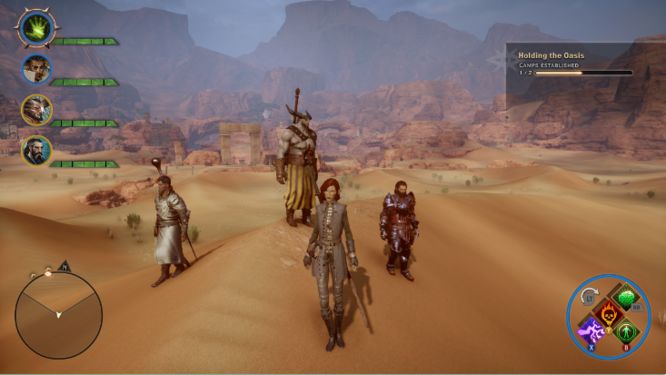
There is a vast array of environments to explore from swampy marshes to sandy wastelands
Getting around such huge worlds has also been made much simpler with the addition of fast travel (once you set up camps in an area) and mounts that can get you from point A to point B much faster than your typical walking speed. The only downside is that exploration is actually easier on foot. Riding a mount such as a horse means that you can't pick up items or engage in combat unless you actually get off the horse, which makes it almost redundant when there are flowers to be gathered every 20 ft along the way.
We can't help feeling like Bioware had quite a few other games on the brain during development of Inquisition. From the huge open worlds like Skyrim, to the exploration and quests that feel more at home in a massive multiplayer role playing game like World of Warcraft, Inquisition picks and borrows some of the best bits from the genre's heavy hitters - and the great thing is, it does everything really really well.
Those of you who are into lore (and have probably read every Dragon Age spin-off novel) will have endless hours of fun collecting papers and letters that add information to the game's huge Codex - a kind of encyclopaedia of everything Dragon Age. Collecting said items also pays out experience points, which is great for those who'd rather stab things than read, too.
It's also great for those who would like to micro-manage every aspect of their character, from their armour down to what kind of material your pommel is made out. Like prior games you can even tinker with your team's basic combat AI, telling your associates what they should be doing in each battle. Sadly, the game does suffer from clunky menus that can take forever to sort through, making micro-managing your inventory and characters more of a chore than it needs to be. Inventory space also fills quickly - and if you don't keep an eye on it, you may find yourself with 7 types of toy soldier taking up as many inventory slots, and no fast way to get rid of them.
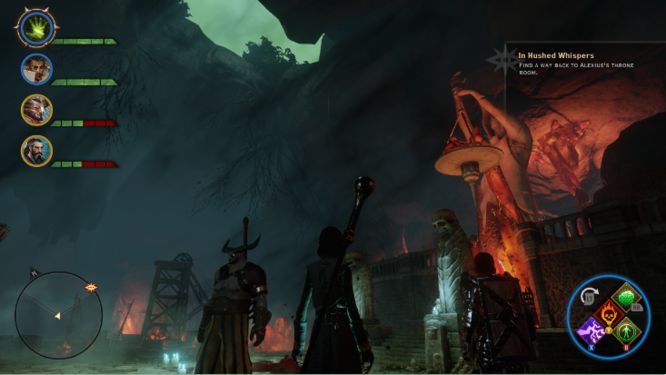
Quests will take you to some very 'interesting' places.
The simple yet fantastic battle system from Dragon Age 2 makes a return, and it's pretty simple to get to grips. Played out in real time, between the character you've built, the allies you take with you, and the abilities you choose, its completely up to you how you approach combat. Each of the classes has their own unique play style, and you can easily switch between characters to find a play style that suits you.
If you want to just click on things until they die, you can, and pretending this is more of a hack-and-slash game like Diablo is totally do-able. If you prefer your battles more tactical, you'll also be glad to see tactical mode making a return from the first game in the series, Dragon Age Origins. Here, the view switches to a top down perspective, and the game pauses, letting you micro manage every aspect of the battle.
The tactical camera does take some getting used to however, feeling downright broken to control at first. But you'll soon find that in later battles against large amounts of enemies, bosses or huge dragons, it becomes an invaluable tool to micro-manage each of your 4 party members on the battlefield, while keeping them out of harms way.
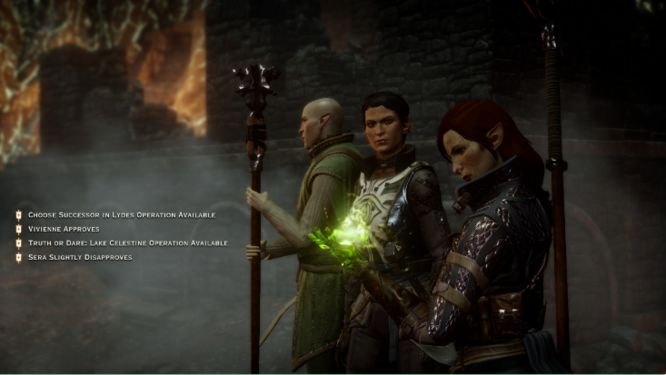
The decisions you make are likely to make some happy while upsetting others.
Its not all fighting in the world of Dragon Age, though. There's a lot of talking too - and as leader of the Inquisition it'll be up to you to forge alliances, and make tough choices using the branching dialogue trees Bioware fans will be more than familiar with. As with all good role playing games, the decisions you make are almost always likely to appease some and upset others. Its a far less black and white affair than previous titles, and these 'grey areas' serve to make you feel like the world is evolving and reacting around you, much like real life.
The War Table is where you manage your Inquisition. Here you'll make some tough choices, and decide how you'll progress through the lands of Ferelden and Orlais. You'll do so using Power, a form of intangible currency you amass by completing quests and side missions. You can then use this Power to unlock new areas to explore. Story progression is at times gated (locked) until you gain enough Power to unlock new story areas. Fortunately, unlike other games we reviewed recently we had no trouble with progressing, having amassed enough Power as we explored and completed side quests to go and do pretty much whatever we wanted. So unless you're planning the impossible task of only playing the story missions and ignoring everything else, you'll be fine.
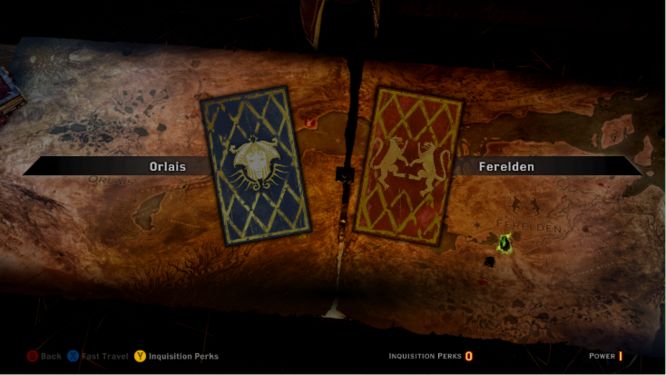
The War Table will become a common sight as you manage your Inquisition.
The War Table is also where you'll be able to send agents out on missions (of which you have no involvement), akin to the similar mini-game found in the Assassins Creed series. While this will net you rewards, we tended not to use these options very often. There are only three agents you can choose from, who each become unavailable while on missions. Missions also take place in real time (which can be anywhere between 15 minutes to several hours - yikes), meaning they end up being tied up for a pretty substantial chunk of your play session.
While they're off galavanting out, you can go off on an adventure of your own to pass the time - but it doesn't work quite as simply as that. As you have to make your way all the way back to the War Table to accept the reward, pulling you away from whatever epic quest you happened to be in at the time, it can be a bit of a faff. Being able to manage this from camp would have been a fantastic option.
In fact being able to manage a number of things in the field would have been great - from selling valuables (junk basically) from your inventory, to upgrading weapons/armour or any number of other bits and bobs while you're on an active quest. The fact that you have to fast travel back and forth to effectively manage your team is a real bummer. Especially when loading times are so long.
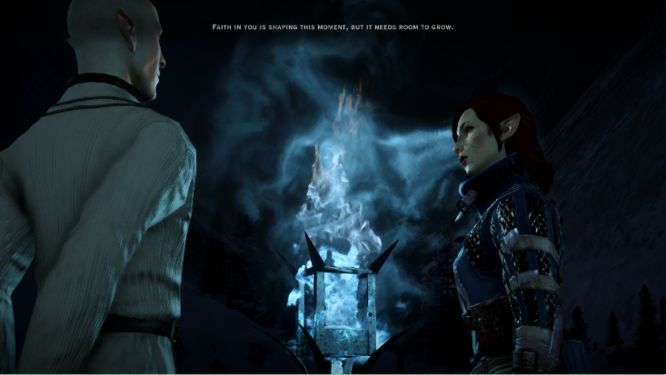
Additional dialogue trees open up depending on your class and race.
While Dragon Age: Inquisition is great, it's not without its faults. As mentioned, the tactical mode can be a pain to use, mostly due to unreliable aiming reticules colliding with terrain. Bioware also continues its trademark of buggy AI, where sometimes (if in a cave or interior location) companions would become locked in battle with an enemy that is out of reach or on the other side of a wall, refusing to follow until you go round the wall for them, and take out the enemy yourself. The only other problem (that will only effect PC players) is that the Keyboard and Mouse controls are extremely awkward, and many may find it more appealing to commit the cardinal sin of using a wired Xbox controller, like we did.
Like every other EA published game released over the last several years, Dragon Age also has its own multiplayer mode for light mission based gameplay and character building not far removed from the tacked on mode found in Mass Effect 3. While its addition is a nice touch, and a good break from adventuring, it ultimately feels unnecessary when the game features a single player campaign of such huge scope. We can only guess that its inclusion might have something to do with milking gullible fans for micro-transactions (but we won't get into any crazy theories here).
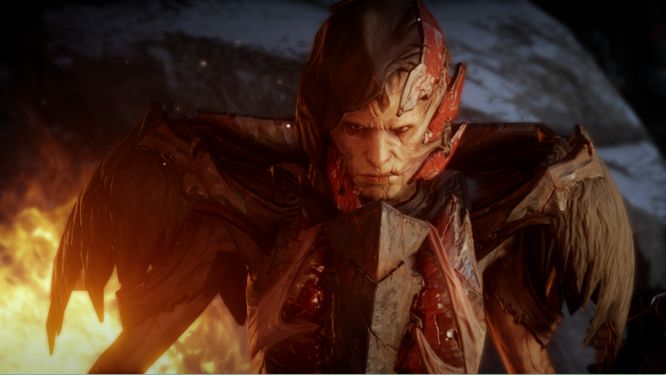
Big bad guy 'The Elder One' looks as if he's been spending time in a Soul Calibur game.
Overall, Dragon Age Inquisition is a great achievement for Bioware. Not only have they created a game that caters for fans of both Dragon Age Origins and Dragon Age 2 but they've managed to create a massive engaging world that players can lose themselves in. It plays like a 'best of' compilation of the last ten years of the RPG genre, and is a must buy for anyone looking for a game to see them through the long winter months ahead.
Format Reviewed: PC


